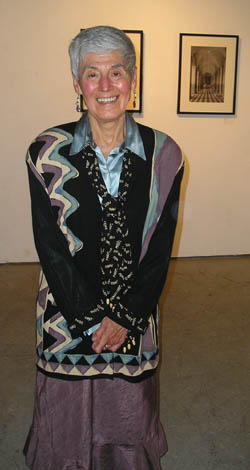The “very determined” Edythe Haendel Schwartz arrived in Sacramento on a lovely evening that saw a few of her cohorts in the Davis Aquatic Masters come to see her. The first piece she read was a new piece entitled “Olympics,” and it was an homage to the notion that “the prize goes to the last one alive.”
The next piece she read was from her chapbook put out by Finishing Line Press entitled Exposure. The piece was called “Chromatic” and it was dedicated a couple she had known some years ago, Jim and Marion.
Nest was “Body Project” and “Does it Hurt?” which focuses on a child’s lesson about pain, such a profound question to a 5-year-old child.
The title piece “Exposure” dealt with water themes and fear, fear that comes from the external environment and the fear of the bureaucratic machinery in the city. The poem was a composite of voices she heard and internalized growing up.
“Reprieve” involved Edythe’s husband, Sy, encountering a sparrow that had struck the window.
Edythe’s father was a civil engineer and “Suspension” was triggered by Edythe’s memory of her father stopping the family car at various suspension bridges and discussing the details of them, in particular the difference between stress and strain.
“Care” was about a former student of hers who became sick, and then came two ekphrastic pieces: “Still Water” (about the indiscriminate placement of a figure in a landscape painting) and “Francois Gilot Tells Picasso He Must Paint Peace” (about Picasso’s “War and Peace” at Stone Chapel in Vallauris, France).
In “Rafting” Schwartz explored the flow of the Limay River through the Patagonian Steppes and the current of intolerance leading to massacre through the centuries. The final line asks, “What’s to come?”
“Habanera” was written in remembrance of the time when her mother had died. the poem reflects on friendship and art, the two keepsakes from her that are objectified in the poem by a friend’s flowers, yellow jonquils, brought to the house and the presence of the music of Carmen.
Finally, “The Conchologist and the Shoemaker” was inspired by the conversation she overheard between a blind professor at UC Davis and a shoemaker. In the poem the conchologist makes the reader he is very aware of his world despite the loss of one of his major senses.
 OLYMPUS DIGITAL CAMERA
OLYMPUS DIGITAL CAMERA




